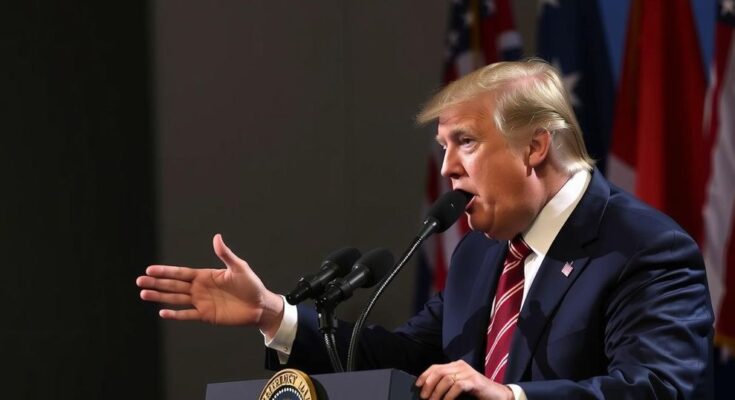Donald Trump intends to withdraw U.S. troops from northern Syria to avoid their vulnerability amid rising tensions between Turkey and Kurdish forces, according to Robert F. Kennedy Jr. The discussion reveals Trump’s strategic concerns about American military presence in a volatile environment in the Middle East, particularly along the Syrian-Turkish border.
Donald J. Trump has expressed a strong desire to withdraw United States troops from northern Syria to avoid placing them in jeopardy as tensions escalate between Turkey and Kurdish forces, according to Robert F. Kennedy Jr. During a discussion with Tucker Carlson, Kennedy detailed that Trump, while considering the complexities of the Middle East, highlighted the vulnerability of American personnel stationed near the Syrian-Turkish border. He emphasized the need to prevent U.S. troops from becoming “cannon fodder” amidst potential conflict. Kennedy shared that on a flight, Trump illustrated a map of the Middle East, which included discussions of the troop presence in the region. Notably, Trump indicated there are 500 American troops at the border encampment, all the while acknowledging the larger troop numbers of 750,000 in Turkey and 250,000 in Syria, though he refrained from clarifying whether these represented Syrian military forces or Kurdish factions. Moreover, Trump voiced concerns regarding the implications of potential confrontations, prompting him to call for their withdrawal. The aftermath of Trump’s recent electoral victory raises questions about shifts in U.S. foreign policy, particularly with allies anxious about his approach to conflicts, including Ukraine. Since 2014, the U.S. has been allied with the Kurdish forces in Syria, yet increasing military confrontations in the region complicate U.S. strategic interests. As the Turkish government perceives the YPG as a branch of the PKK, calls for military intervention in Syria have occurred frequently. There’s also an ongoing internal struggle in Syria with the national government aiming to reclaim territories lost since the civil war commenced in 2011.
The geopolitical landscape in northern Syria has been tense, particularly concerning the relationships between U.S. forces, Turkish military aspirations, and Kurdish factions. Since the rise of the Islamic State, U.S. troops have engaged with Kurdish groups to combat extremist threats. However, this involvement has drawn the ire of Turkey, which has continually sought to neutralize what they regard as terrorist threats from the PKK. The region is characterized by a complex interplay of local and international agendas, making any troop withdrawal a significant shift in established U.S. foreign policy.
In conclusion, Robert F. Kennedy Jr. has provided insights into President Trump’s strategic mindset regarding U.S. military presence in northern Syria. Trump’s intention to withdraw troops stems from concerns about their safety in a volatile region and aligns with his broader foreign policy outlook. As potential conflicts loom between Turkey and Kurdish forces, the implications of such a withdrawal could reverberate throughout the Middle East, reshaping alliances and U.S. engagement in the region.
Original Source: www.middleeasteye.net




